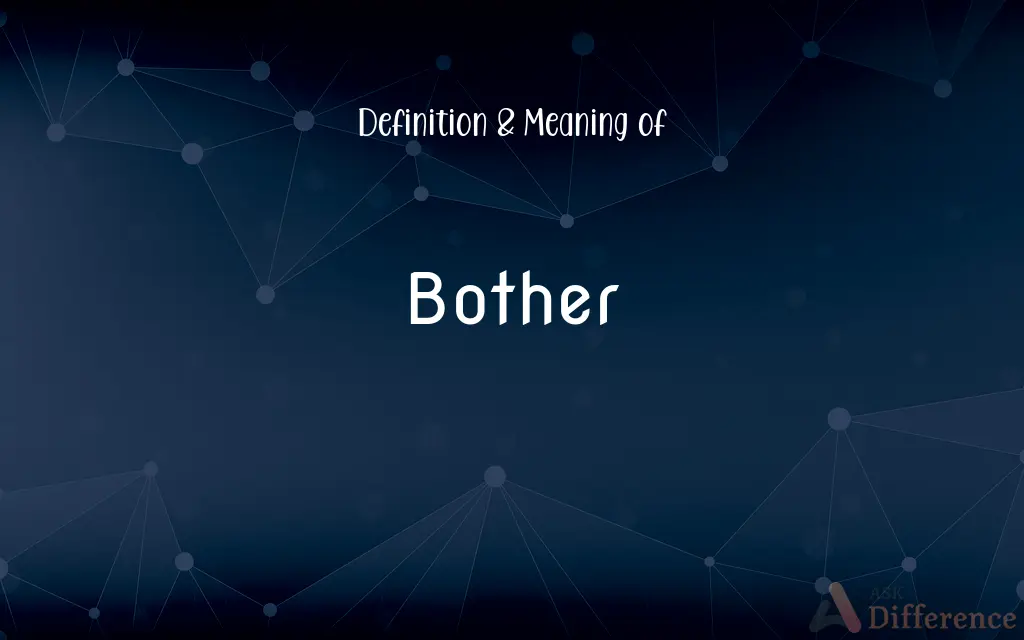Bother Definition and Meaning
By Tayyaba Rehman & Maham Liaqat — Updated on March 5, 2024
To bother means to annoy, disturb, or cause inconvenience or concern to someone. e.g., Did I bother you by coming over unannounced?

Table of Contents
Bother Definitions
Cause Annoyance: To make someone feel annoyed or irritated.
Loud noises from the street bother me when I'm working.
Cause Concern: To make someone worry or feel concerned.
It bothers me that he hasn't called.
Intrude Upon: To interrupt or impose on someone unnecessarily.
I hope I'm not bothering you with my questions.
Provoke Discomfort: To cause physical or emotional discomfort.
This tag on my shirt bothers my neck.
Cause Disturbance: To disrupt someone's peace or comfort.
Please don't bother the sleeping baby.
Exert Effort: To take the trouble to do something; to make an effort.
He didn't bother to lock the door.
Seek Attention: To attempt to attract attention or communicate, sometimes annoyingly.
She bothers her brother when she's bored.
Cause Difficulty: To make something more difficult or challenging.
The puzzle bothers me because it's so hard to solve.
Persistently Annoy: To continue annoying someone repeatedly.
Why do you keep bothering her after she asked you to stop?
Raise Concerns: To bring up issues or concerns that cause worry.
The recent changes in policy bother many employees.
To cause to be irritated, especially by repeated acts; trouble or annoy
“I spoke French badly. So I always replied to him in English. This didn't bother him” (Paul Theroux).
To make agitated or perplexed; upset
“Jerry could see … how much the doctor had been bothered by the failure of the first surgery” (Rick Bass).
To intrude on without warrant or invitation; disturb
“When I saw him slumped in a chair, deep in thought, I decided not to bother him” (Pat Toomay).
To give discomfort or pain to
A back condition that bothers her constantly.
To take the trouble (to do something); concern oneself with (accomplishing something)
“Most people [with the syndrome] have such mild symptoms that they never bother to see a doctor” (Jane E. Brody).
To take trouble; concern oneself
“old, hard-to-reach coal seams that were too complex or dangerous for other coal companies to bother with” (Jeff Goodell).
A cause or state of disturbance.
Used to express annoyance or mild irritation.
(transitive) To annoy, to disturb, to irritate.
Would it bother you if I smoked?
(intransitive) To feel care or anxiety; to make or take trouble; to be troublesome.
Why do I even bother to try?
(intransitive) To do something which is of negligible inconvenience.
You didn’t even bother to close the door.
Fuss, ado.
There was a bit of bother at the hairdresser's when they couldn't find my appointment in the book.
Trouble, inconvenience.
Yes, I can do that for you - it's no bother.
A mild expression of annoyance.
To annoy; to trouble; to worry; to perplex. See Pother.
To feel care or anxiety; to make or take trouble; to be troublesome.
Without bothering about it.
One who, or that which, bothers; state of perplexity or annoyance; embarrassment; worry; disturbance; petty trouble; as, to be in a bother.
An angry disturbance;
He didn't want to make a fuss
They had labor trouble
A spot of bother
Something or someone that causes trouble; a source of unhappiness;
Washing dishes was a nuisance before we got a dish washer
A bit of a bother
He's not a friend, he's an infliction
Take the trouble to do something; concern oneself;
He did not trouble to call his mother on her birthday
Don't bother, please
Cause annoyance in; disturb, especially by minor irritations;
Mosquitoes buzzing in my ear really bothers me
It irritates me that she never closes the door after she leaves
To cause inconvenience or discomfort to;
Sorry to trouble you, but...
Intrude or enter uninvited;
Don't bother the professor while she is grading term papers
Make nervous or agitated;
The mere thought of her bothered him and made his heart beat faster
Make confused or perplexed or puzzled
Bother Snonyms
Trouble
To cause worry or inconvenience.
I hate to trouble you, but could you help me move this?
Annoy
To irritate or make someone slightly angry.
The loud music next door began to annoy him.
Irritate
To make someone annoyed or slightly angry.
His arrogance began to irritate his coworkers.
Harass
To subject to aggressive pressure or intimidation.
The constant calls from telemarketers began to harass her.
Vex
To make someone feel annoyed, frustrated, or worried.
The puzzle was designed to vex and challenge the mind.
Aggravate
To make a problem or situation worse or more serious.
Constant interruptions aggravate the speaker.
Disturb
To interrupt the peace, rest, or privacy of; to bother.
Please do not disturb her while she's studying.
Nag
To annoy or irritate (a person) with persistent fault-finding or continuous urging.
She would nag him to do his chores.
Perturb
To make someone anxious or unsettled.
The strange noise in the night perturbed the sleeping family.
Pester
To bother or irritate with persistent or urgent requests.
Children began to pester their parents for a new toy.
Bother Idioms & Phrases
Don't bother
Used to tell someone not to worry about doing something because it is unnecessary.
Don't bother making dinner; I've already ordered us pizza.
Bother one's head about/over
To worry or concern oneself with something.
Don't bother your head about the rumors; they're probably not true.
Why bother?
A rhetorical question asking why one should make an effort when it seems pointless.
Why bother cleaning now when the kids will just mess up the house again?
Bother on someone's behalf
To take on trouble or effort for someone else's benefit.
He went to the bother of driving across town on his friend's behalf.
Worth the bother
Justifying the effort or trouble taken.
Seeing her smile made all the preparations worth the bother.
At bother's end
Extremely frustrated or perplexed.
I'm at bother's end trying to solve this math problem.
Make a bother
To cause trouble or inconvenience.
I hope I'm not making a bother by asking for a ride.
Can't be bothered
Unwilling to make the effort to do something.
I can't be bothered to go out tonight; I'm too tired.
Not worth the bother
Something that is not worth the effort or trouble.
Trying to fix that old car isn't worth the bother; you should just buy a new one.
Too much bother
Too much trouble or effort.
Cooking a three-course meal is too much bother for just one person.
Bother about/over nothing
To worry or fuss over something that is not important.
You're bothering about nothing; everything will be fine.
Save someone the bother
To do something so someone else doesn't have to.
I'll mail these packages for you to save you the bother.
Let it bother you
Allowing something to affect one's emotions or peace of mind.
He said some harsh words, but don't let it bother you.
Bother and fuss
Unnecessary concern or activity around a minor or routine matter.
She made such a bother and fuss over the decorations for the party.
To bother with
To take the trouble to engage with something or someone.
I didn't even bother with a response to such a ridiculous argument.
Bother the life out of someone
To annoy or irritate someone intensely.
Stop tapping your pen; it's bothering the life out of me.
Without bother
Without trouble or difficulty.
We were able to set up the new software without bother.
Bother to the core
To be deeply troubled or annoyed by something.
The unfairness of the situation bothered her to the core.
Bother someone's peace
To disturb someone's tranquility or calm.
Loud construction noise has been bothering our peace all week.
Bother under the skin
To irritate or annoy someone deeply.
His arrogant attitude really gets under my skin.
Bother Example Sentences
She didn't want to bother her parents with her problems.
It doesn't bother me if you arrive late.
Why do you bother him when he's trying to study?
Loud talking in the library bothers everyone trying to concentrate.
Will it bother you if I open the window?
The constant dripping of the faucet bothers me at night.
He bothered to write a thank-you note for each gift.
The mosquitoes were bothering us at the picnic.
They asked me not to bother about the details.
It bothers me that I can't remember where I left my keys.
Don't bother the teacher during her lunch break.
She's always bothered by the idea of flying.
The thought of moving to a new city bothers him.
His dismissive attitude bothers his coworkers.
She bothers to check on her elderly neighbor every day.
Common Curiosities
Why is it called bother?
The term "bother" likely originates from a combination of the Middle English word "boteren" (to annoy) and the Irish word "bodhar" (deafened or annoyed). It reflects a sense of irritation or inconvenience.
What is the root word of bother?
The root word of "bother" is not clear-cut, as it likely derives from a mix of Middle English and Irish origins without a singular, identifiable root.
How is bother used in a sentence?
Please don't bother the sleeping dog.
What is the verb form of bother?
The verb form of "bother" is "to bother."
How do we divide bother into syllables?
Bother is divided into syllables as "both-er."
What is a stressed syllable in bother?
The first syllable, "both," is the stressed syllable in "bother."
How many syllables are in bother?
There are two syllables in "bother."
What is the pronunciation of bother?
Bother is pronounced as /ˈbɑðər/ in American English.
What is the second form of bother?
The second form of "bother" is the simple past form, "bothered."
What is the singular form of bother?
The singular form is "bother."
What is the opposite of bother?
The opposite of "bother" could be "soothe" or "comfort."
What is the first form of bother?
The first form of "bother" is the base form, "bother."
What is another term for bother?
Another term for "bother" is "annoy."
Is bother an adverb?
No, "bother" is not an adverb.
Is bother an abstract noun?
Yes, when "bother" is used as a noun, it is considered an abstract noun since it refers to a concept or state of being annoyed, rather than a physical object.
Is bother a countable noun?
Yes, when used as a noun, "bother" can be countable, as in "many bothers."
Is bother a collective noun?
No, "bother" is not typically used as a collective noun.
Which determiner is used with bother?
Determiners like "a," "the," "much," or "little" can be used with "bother," depending on the context.
What is the plural form of bother?
The plural form is "bothers."
Which vowel is used before bother?
This question is context-dependent. Vowels in articles or prepositions (e.g., "a" or "an") used before "bother" depend on the syntax and semantics of the sentence.
Is bother a negative or positive word?
"Bother" is generally considered a negative word because it conveys irritation or inconvenience.
Is the word bother Gerund?
"Bothering" is the gerund form of the verb "bother."
Is the word “bother” a Direct object or an Indirect object?
"Bother" can be the direct object of a sentence when it is something being acted upon: "I don't want to cause you bother." It does not typically serve as an indirect object.
What is the third form of bother?
The third form of "bother" is the past participle form, "bothered."
Which preposition is used with bother?
Prepositions like "with," "about," and "to" can be used with "bother," depending on the context.
What part of speech is bother?
"Bother" can be a verb (as in to annoy) or a noun (as in an annoyance).
Is bother a noun or adjective?
"Bother" can be a noun (meaning trouble or annoyance) and a verb, but it is not used as an adjective.
Is bother a vowel or consonant?
"Bother" is neither a vowel nor a consonant; it is a word. The word itself contains both vowels and consonants.
Is the bother term a metaphor?
The term "bother" itself is not a metaphor, but it can be used metaphorically in some contexts.
Is the word bother imperative?
"Bother" can be used in the imperative form, as in a command or request: "Don't bother."
Which conjunction is used with bother?
Conjunctions are not specifically tied to the word "bother" but depend on the sentence structure, e.g., "and," "but," or "or."
Which article is used with bother?
Both "a" and "the" can be used with "bother," depending on whether it is being referred to in a specific or general sense.
Share Your Discovery

Previous Term
Description Definition and Meaning
Next Term
Completing Definition and MeaningAuthor Spotlight
Written by
Tayyaba RehmanTayyaba Rehman is a distinguished writer, currently serving as a primary contributor to askdifference.com. As a researcher in semantics and etymology, Tayyaba's passion for the complexity of languages and their distinctions has found a perfect home on the platform. Tayyaba delves into the intricacies of language, distinguishing between commonly confused words and phrases, thereby providing clarity for readers worldwide.
Co-written by
Maham Liaqat


































